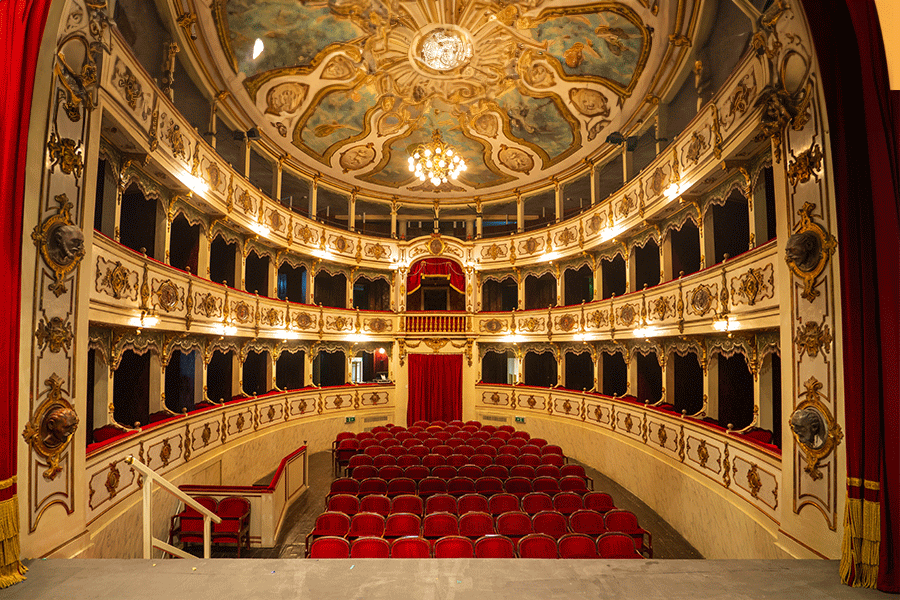In the pitch-dark auditorium of Rome’s Teatro Costanzi, a high-pitched lament floated from the top galleries. Dozens of flashlights snapped on, their beams crisscrossing crazily, seeking the source of the sound.
The shafts of light homed in on a spectral figure — a slim, dark-haired woman dressed in white, moving at a funereal pace and plaintively singing. In the audience, 130-odd children, ages 8 to 10, let loose squeals, some gasps, and one “it’s not real.” Several called out “Emma, Emma.”
The children had just been told that the Costanzi, the capital’s opera house, had a resident phantom. No, not that one. This was said to be the spirit of Emma Carelli, an Italian soprano who managed the theater a century ago, and loved it so much that she was loath to leave it, even in death.
“The theater is a place where strange things happen, where what is impossible becomes possible,” Francesco Giambrone, the Costanzi’s general manager, told the children Saturday afternoon when they arrived to participate in a get-to-know-the-theater-sleepover.
Music education ranks as a low priority in Italy, the country that invented opera and gave the world some of its greatest composers. Many experts, including Giambrone, say their country has rested on its considerable laurels rather than cultivate a musical culture that encourages students to learn about their illustrious heritage.
With little backing from schools or lawmakers, arts organizations like the Costanzi have concluded that it is up to them to reach out to the young.
Giambrone sought to dispel opera's stuffy image by abandoning the genre’s strict dress code. That change, like the sleepover, is part of his effort to make opera, often seen as an elitist, highbrow and abstruse art form for the initiated, more familiar and accessible, especially to children.
“We believe that the theater should be for everyone, and that it should make people feel at home,” Giambrone said in an interview. Hence the decision to welcome youngsters to eat, sleep and play there. “Once a theater is a home, it is no longer something distant, something a bit austere to fear, or somewhere you feel inadequate,” he said.
“There’s a lot of talk about ‘made in Italy,’ but real shortsightedness when it comes to our musical patrimony, which is envied throughout the world,” said maestro Antonio Caroccia, who teaches music history at the Santa Cecilia conservatory in Rome. He said that “politicians are deaf to it.”
“Italy is far behind” many other countries, said Barbara Minghetti, of Opera Education, which creates programs for children. “This I can guarantee.”
Rather than letting its opera culture wither, Giambrone said, “Italy should be teaching other countries how it’s done.”
At the Teatro Costanzi, more than half of the children at the sleepover belonged to scout troops from Rome’s outlying neighborhoods. They were accompanied by coolheaded scout leaders who — impressively — commanded silence just by raising a finger.
Most of the children had never visited the theater before. “Come to think of it, I haven’t been there either,” said Gianpaolo Ricciarelli, one of the parents who dropped off his son.
Another father, Armando Cereoli, said, “Between video games, cellphones and Netflix, there’s tough competition to get kids interested in beautiful things.”
Some of the children came from disadvantaged neighborhoods, so the visit was “a chance to free their minds and to dream,” said Sara Greci, a scout leader and Red Cross worker who brought four girls from a home for abused women and their children.
The opera house runs several outreach programs for the homeless or people who live in Rome’s most far-flung neighborhoods, a way to open the theater to the city and broaden its reach, said Andrea Bonadio, who was hired by the theater to work on such programs.
Nunzia Nigro, the theatre's director for marketing and education, said that several of the children who had participated in the theatre's educational programs over the past 25 years were loyal patrons today. “We’re beginning to reap some of those efforts, and have a younger public,” she said.
After being serenaded with music, including Brahms’ classic lullaby, the children settled down (or tried to) in a patchwork of sleeping bags on an artificial green lawn used in a previous production of Madama Butterfly. Above them loomed oversize photos of some of the stars who performed at the Costanzi, including Maria Callas, Herbert von Karajan and Rudolf Nureyev.
After breakfast Sunday, the children took part in workshops at which they designed colorful paper ballet costumes, learned basic ballet positions, sang as part of a choir (some more enthusiastically than others) and played an opera-themed version of snakes and ladders. The game was designed and overseen by Giordano Punturo, the opera’s stage manager, done up in a tuxedo and colorful top hat.
He didn’t know about the kids, he said, “but I had the time of my life.”
After a group singalong and photo, it was almost time to head home.
“Did you have fun?” Giambrone asked the kids. “Yes!!” they cheered. “Did you sleep well?” he asked, to a more mixed response. Several “No”s were notably heard. Come back soon, he said.
After hugging his parents who had come to pick him up, Andrea Quadrini, almost 11, couldn’t wait to tell them that his team had won at snakes and ladders, and that the treasure hunt had been especially fun.
“Wow,” he said. “I saw an opera theatre for the first time.”
The New York Times News Service










